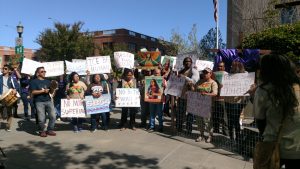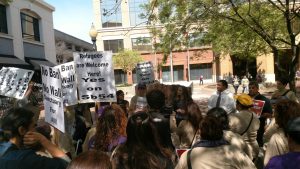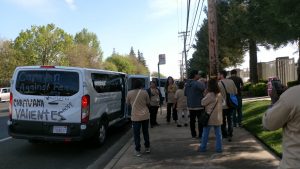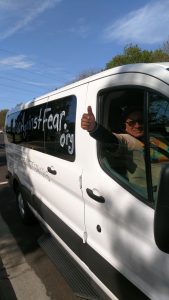 The Federal Building looms overhead like a threat as the protesters gather. Washington policies have brought them here to Sacramento, to push the state government to protect its citizens and communities from the anti-immigrant orders of the 45th president.
The Federal Building looms overhead like a threat as the protesters gather. Washington policies have brought them here to Sacramento, to push the state government to protect its citizens and communities from the anti-immigrant orders of the 45th president.
Union members, migrants, government officials and grassroots organizers—the categories often overlap—chant and march before stepping up to the mike to tell their stories and make their promises. Matching t-shirts read “Caravan Against Fear” with dates in April and a graphic of a child, her arms spread in a welcoming gesture, her face turned upward in hope.
It’s the launch of an unusual caravan for unusual times. One sign reads “Somos el pueblo. Respeta nuestra humanidad”—We are the people. Respect our humanity. Since when do the residents of an advanced democracy have to plead for respect for their humanity?
Apparently, since the election of Donald Trump. Although deportations and fear existed before, since November 2016 and the orders of the Trump administration to arrest, detain and deport up to 3 million undocumented workers the atmosphere has gotten much uglier. In this “America,” even authorized migrants can be targets, families hide in their own homes, police are reassigned to hunt migrants rather than criminals, and the wall on the border has become the visible sign of the far more dangerous and insidious construction of walls within the hearts and minds of U.S. citizens.
“I was born here but I’ve always lived in fear because my parents always lived in fear,” Melissa Santos said to the crowd. She described years of being instructed not to answer the door and being scared going out to the store for fear her undocumented parents could be deported. Her mother suffered domestic violence during most of Melissa’s childhood and couldn’t call the police. If a childhood of fear and violence was bad, she believes the nation is headed into even worse times.
 “Ever since Trump won the election, immigrants became targets, and now they’re even more targeted because they can’t call law enforcement,” she told a crowd of caravan members and supporters. One after another, speakers described communities locked in fear and families paralyzed by the uncertainty of how and when their lives could be permanently disrupted.
“Ever since Trump won the election, immigrants became targets, and now they’re even more targeted because they can’t call law enforcement,” she told a crowd of caravan members and supporters. One after another, speakers described communities locked in fear and families paralyzed by the uncertainty of how and when their lives could be permanently disrupted.
“Living in the shadows” former president Obama called it, and in the end, he failed to remedy the situation. With the arrival of Donald Trump, the shadows deepened and for millions of people, including many of those here today, going about the tasks of daily life risks being separated from loved ones, friends, jobs and homes.
California Values, California Resistance
Workers from the Service Employees International Union (SEIU) and immigrant and human rights organizations in border states organized the caravan to confront that growing fear and bring together resistance actions. In large part as a result of their pressure, the state of California is taking a prominent role in confronting Trump’s vision of a nation delivered into the hands of a white, male, wealthy elite.
As the world’s sixth largest economy if considered a separate country (something that has been seriously proposed since the Trump election), the state has the economic muscle to chart its own course. As the state that hosts more immigrants than any other, California and many of its elected representatives have taken a stand against the deportation and anti-worker polices of a president they did not elect.
 The main goal now is passage of Senate Bill 54. SB54 is a proposal to make the entire state of California a “sanctuary state.” Although related laws exist and municipalities have adopted similar measures, this would be the first statewide declaration on the books. It mandates police to act as police and not immigration enforcement officers, and banishes ICE operations, providing relief to immigrant families afraid they could be nabbed at any moment.
The main goal now is passage of Senate Bill 54. SB54 is a proposal to make the entire state of California a “sanctuary state.” Although related laws exist and municipalities have adopted similar measures, this would be the first statewide declaration on the books. It mandates police to act as police and not immigration enforcement officers, and banishes ICE operations, providing relief to immigrant families afraid they could be nabbed at any moment.
“California has been very successful,” noted State Senator Richard Pan, a supporter of the bill. “Other states and other countries want to emulate what we’re doing, and part of that is our embrace of our diversity. We have many immigrants who have come to California and contributed vitally to our culture, our economy and to the vibrant place that we call California. So, when someone tries to inject fear and distrust and division, that’s counter to what we believe here and what we should believe in the United States.”
“What we do here in California is going to have an effect on the rest of the country,” notes SEIU-USWW president David Huerta to a cheering crowd.
SB54 is also known as the California Values bill and that’s the real battle here. Although the United States has a deep vein of racism running throughout its history, formally driving out immigrants has happened only briefly and sporadically in the past. To make that a part of a new vision to “Make America Great Again” runs against the day-to-day reality of what actually does make America great. It lacerates whole families and communities.
In the age of open racism, the joyful diversity of the demonstration is in itself defiant. The signs reflect the movement’s demands: “ICE out of California,” “Families united to protect immigrants and refugees,” “Unstoppable together,” “#HereToStay,” “Immigrants welcome here,” “No Ban, No Wall.” Someone starts the chant that marked the Jan. 21 March on Washington: “This is what democracy looks like!” Another modifies it: “This is what California values look like!”
Caravan’s border journey
 The Caravan against Fear is a joint effort of some 230 organizations. The route winds through California then sets off along the border, just as the Trump administration calls for the first multi-million dollar bids to build more wall, and moves forward on plans to beef up anti-immigration measures disguised as national security.
The Caravan against Fear is a joint effort of some 230 organizations. The route winds through California then sets off along the border, just as the Trump administration calls for the first multi-million dollar bids to build more wall, and moves forward on plans to beef up anti-immigration measures disguised as national security.
Following the demonstration at the Sacramento Federal Building, some 60 people loaded into white vans with slogans and hashtags painted on their sides. The buses headed off to the next stop in Modesto where they met with state Assembly members.
Back on the road, walkie-talkies keep the vans in line—no one is allowed to jump ahead or straggle behind. At a community meeting in Stockton, caravan and community members relate experiences that follow a common thread: They begin with injustice and they end with empowerment.
Night is a short rest on a hard floor, but no one complains. More than 1,000 miles lie ahead, and just as many stories. Fear is a tool of autocrats and bigots, and the Trump administration knows that. But it requires the acquiescence of the fearer.
The message of the Caravan is simple: Break the fear by coming out of the shadows, not withdrawing deeper. And in the daylight, we can see each other, join together and fight back.
Laura Carlsen is director of the Americas Program, www.americas.org. She formed part of the Caravan Against Fear April 10-May 1, 2017



